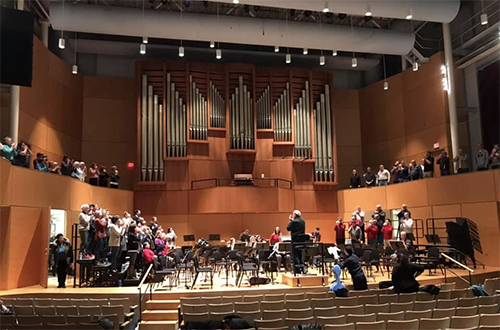by Peter Feher

With Italy in mind rather than the Soviet menace, the most famous part of Prokofiev’s score, “Montagues and Capulets,” sounded positively medieval. Music director Victor Liva emphasized the weighty precision of dotted notes, which made for a powerful opening but a second half that dragged. The strings picked up the tempo in two impressively quick movements, the nimble “Juliet as a Young Girl” and the furious “Death of Tybalt.” Like Tchaikovsky’s ballet scores, there’s something impersonal about Prokofiev’s sheer volume of notes, but the Cleveland Philharmonic players found the right mix of technical precision and casualness.
Liva kept ballet at the fore in three dance movements. The “Minuet” stayed upbeat and celebratory, perhaps the cheeriest scene in Prokofiev’s score. With appropriately heavy cymbal-playing, “Masks” evoked all the circus connotations of Shostakovich’s noisier works (a reminder that Prokofiev wrote his share of noisy pieces too). The simply named “Scene” featured a brief, charming solo for violinist Andréa Belding Elson, who was an engaged concertmaster throughout the concert.
Poulenc’s Gloria brought a similar balance of drama and levity to the evening. In stage setup alone, the performance offered a kind of grandeur: two choirs, Choral Arts Cleveland and the Cleveland Pops Orchestra Chorus, positioned on risers to the side of the orchestra and in balconies above. The setup proved its worth in the magisterial opening movement, “Gloria,” with sound coming at the audience from above and below. It didn’t make things easy from an ensemble point of view, however, and the second movement, “Laudamus te,” suffered delayed entrances. “Domine Fili unigenite” began with a powerful unison from the choir, some of the clearest singing of the night.
Soprano Madelyn Hasebein joined orchestra and chorus in three movements. She navigated her upper register well, not letting high notes stick out where they shouldn’t, particularly in a tricky ascending lick that reoccurs in “Domine Deus, Agnus Dei.” If in softer sections her voice sometimes quavered, full ensemble passages spurred her to sing out in an open, easeful way. Liva skillfully kept orchestra and chorus under Hasebein’s solo lines so that everything could be heard.
Two medleys of carols closed out the concert and provided the promised holiday cheer. Vaughan Williams’ Fantasia on Christmas Carols featured baritone Dylan Glenn in a host of English folk tunes, some sung in full, some taken up in snippets by chorus or orchestra. Glenn brought polish and professionalism to the plaintive, understated piece. A second medley of more familiar carols — “Deck the Halls” and more — invited the audience to sing along, the ending to many a holiday concert.
Published on ClevelandClassical.com December 16, 2019.
Click here for a printable copy of this article



